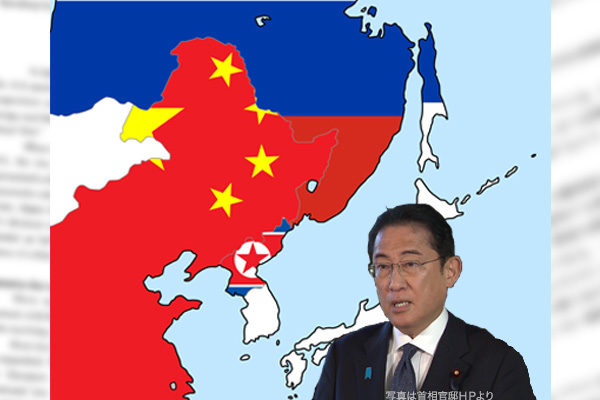Japan’s National Security Strategy, approved by the cabinet in December last year, can be regarded as an excellent one because it emphasizes the perspective of securing national security by comprehensive national power. Unfortunately, however, it has two flaws.
First, it lacks a nuclear deterrence strategy. The National Security Strategy is a 31-page fruition, but devotes only two lines about nuclear deterrence. It describes only the enhancement of U.S. extended deterrence and Japan’s strict adherence to its three non-nuclear principles. This can hardly be called a nuclear deterrence strategy.
The second flaw is that a situation where China, Russia, and North Korea will have to be dealt with simultaneously on three fronts is not assumed. It describes China as "the greatest strategic challenge," Russia as " the most significant and direct threat to security in the European region," and North Korea as "an even more grave and imminent threat to Japan's national security than ever before." However, while expressing "strong security concern" about China-Russia collaboration, the strategy makes no mention of trilateral collaboration between China, Russia, and North Korea.
Lack of 3-front operations plan and nuclear deterrence strategy
A crisis is now emerging, as if taking advantage of this flaw. Russia is approaching North Korea, reportedly asking for weapons that are in short supply due to the protracted war in Ukraine. In return, North Korea is said to be demanding advanced technologies for strategic nuclear submarine, intercontinental ballistic missile, military reconnaissance satellite and others from Russia. North Korean leader Kim Jong Un arrived in the Russian Far East to meet Russian President Vladimir Putin. As military relations between Russia and North Korea become closer, Japan will be forced to address the three fronts of China, Russia, and North Korea.
A Taiwan contingency is a Japan contingency. If North Korea maneuvers on the Korean Peninsula in response to a Taiwan contingency and the Russian Far East forces respond, it will be difficult for Japan and the United States to concentrate their forces in the direction of Taiwan.
Note, however, that North Korea is no longer capable of breaking through the 38th parallel bordering South Korea with conventional forces. It will mainly focus on nuclear missile threats and intimidation and disruption of South Korean society by using special operations forces. Russian forces in the Far East, on their part, will mainly focus on operations using air and naval forces and nuclear threats and intimidation since the main force of the Russian military has been dispatched to Ukraine.
Even so, U.S. forces in South Korea will become immobilized, and the Japanese Self-Defense Forces will also face difficulty of concentrating their troops in the south. Furthermore, if China, Russia, and North Korea collaborate to carry out nuclear threats and intimidation, Japan without a nuclear deterrence strategy will be unable to do anything. South Korean President Yoon Seok Yeol visited the U.S. in April and clinched the "Washington Declaration" with U.S. President Joe Biden, in which the U.S. pledged to enhance extended nuclear deterrence for South Korea. Japan does not have even such declaration with the U.S.
Feared collapse of deterrence against China’s invasion into Taiwan
Kim Jong Un’s visit to Russia is urging Japan to urgently and seriously develop three-front operations plan and a nuclear deterrence strategy. The biggest concern is that Chinese President Xi Jinping may judge Japan as easy to manipulate if Japan cannot respond to the new situation, leading to a collapse of a deterrence against China’s invasion into Taiwan.
Kunio Orita is a member of the JINF Planning Committee and a special professor at Reitaku University. He is a retired Lieutenant General of the Japan Air Self-Defense Force.


